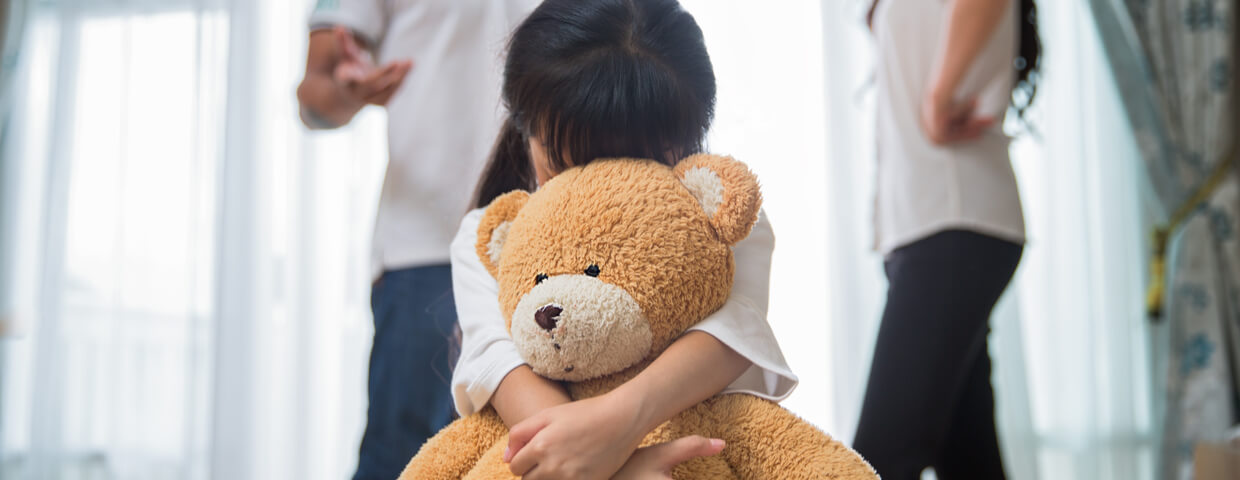Symptoms of Toxic Stress & Childhood PTSD
Some kinds of stress are good for the body, and some types aren't. Here's everything you need to know about "toxic stress" and the role it plays in childhood PTSD.
What is Toxic Stress?
"Good" stress has many benefits for the human body. It keeps us focused and energized, allowing us to complete tasks, achieve great things, or escape danger. However, when stress is prolonged and has no resolution, it becomes "toxic stress." For example, what a child might feel as a victim of domestic abuse.
Toxic stress is unhealthy for people of all ages because it puts a constant strain on the fight-or-flight response and causes the whole system to burn out. However, this is especially true for children who have fewer coping mechanisms and less control over their environment.

Signs of Toxic Stress
Toxic stress can be a big part of childhood trauma and may even lead to PTSD symptoms. Because of this, it's important to understand the effects of toxic stress on a child's body.
Immune system issues
When toxic stress is putting constant strain on a child, the first thing to suffer is often the immune system. Kids suffering from toxic stress get sick easier and stay sick longer--and, on top of that, their risk for serious issues like autoimmune diseases is much higher.
Endocrine system issues
Toxic stress can also interrupt the hormones responsible for growth, weight gain, and puberty. This can cause kids to gain too much weight, grow too slowly, or even experience early puberty.
Emotional issues
The kind of worry, helplessness, and frustration associated with toxic stress can create all types of emotional problems--from anxiety to depression to increased agitation.
See how trauma and toxic stress affect the developing brain >>>
What is PTSD?
In simple terms, PTSD is a response that some people may develop after experiencing or witnessing a traumatic event like violence, an accident, or sexual abuse. It can also be the result of toxic stress.
Not everyone who goes through trauma will develop PTSD. There are a variety of complicated factors at play, from the severity of the incident to the responses of family members or those involved--which means that PTSD is a very personal disorder. Everyone—including children and adolescents—will experience PTSD a little differently and perhaps have different symptoms.
PTSD Symptoms in Kids
Although understanding childhood trauma isn't always easy (especially since kids often can't put their feelings into words), it is important to keep an eye out for these common symptoms of PTSD.
Avoidance
Kids experiencing PTSD will often try to avoid people, places, and situations that remind them of the traumatic event. This might mean getting very upset by having to go somewhere or see someone, or they may be unable to remember parts of what happened, or the event entirely.
Flashbacks and Nightmares
Flashbacks and nightmares may be the most well-known PTSD symptoms. Flashbacks are usually vivid, disturbing memories of the incident. Nightmares are sometimes vague and filled with the emotions experienced during the original event; while other times, they can be very specific and realistic.
Emotional Distress
PTSD involves a lot of emotional responses--and those responses are different depending on the individual. Some children will show signs of aggression, while others will become depressed or anxious--and many will have trouble in school.
Other Symptoms
Other symptoms that may be an indicator of PTSD, especially following a traumatic event, include:
- Reenacting what happened during playtime or in drawings
- Anxiety, feelings of shame or guilt, or being detached or disinterested
- Changes in sleep habits, including insomnia or sleeping more than usual
- Being jumpy or easily startled
- Changes in mood or losing interest in things they used to enjoy
- Being hypervigilant
- Isolating themselves
- Problems focusing or getting schoolwork done
If you're concerned about PTSD symptoms in your child or want to know more about how childhood trauma and toxic stress could be affecting your child, please contact us for the help, answers, and support you need.


